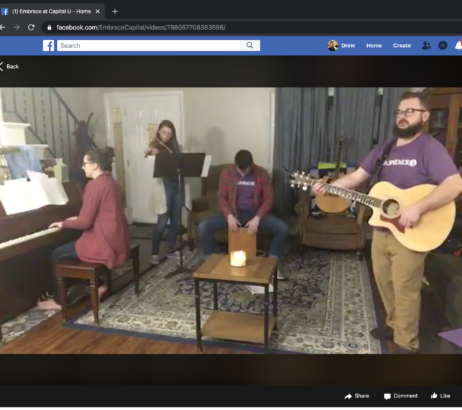Digitally Engaging, Sharing Love and Embracing Holistic Wellness
In the earliest days of the church, Christians became known as risk takers. Why? Not because of an affection for free climbing, BASE jumping, or wingsuit flying. Because they were willing to hang with people who had infectious diseases to provide medical care, relational ministry, and spiritual support. They risked their own physical wellness to promote the holistic wellness – mind, body, and spirit – of others. Part of the commitment of faith was to push yourself beyond your comfortable boundaries in order to honor the integrity of others, to ensure they had the chance to live abundant life.
My, how the tables have turned. In a digital age, we’re now confronted with the COVID-19 pandemic. Being a church concerned with medical care, relational ministry, and spiritual support now means meeting digitally. Temporarily separating bodies rather than risking proximity, so we who might be carriers of a disease reduce the risk of infecting the most vulnerable among us, whose immune systems are compromised, as well as slow the spread so we do not overwhelm key medical resources like respirators.
The commitment of faith is still to push ourselves beyond comfortable boundaries, but in this moment, it is about isolation so we don’t risk the lives of others.
At Capital University, the student staff in Kerns Religious Life Center and Trinity Lutheran Seminary pivoted quickly to ensure that spiritual care for our community wouldn’t be interrupted. We committed to live-streaming every regular worship service and modifying them for online engagement. They’ve developed online Bible studies in GroupMe, initiated small group Zoom meetings, and provided countless 1×1 prayer and support conversations through texts, phones, and FaceTime. We do this, like the earliest Christians, because we believe all people deserve bodily health, spiritual vitality, and interpersonal engagement.
As a church in an age of COVID-19, it’s time to be certain of our identity and nimble in our expressions.
Inspired by what Greg Jones once called traditioned innovation and by what the Network of ELCA Colleges and Universities describes as “Rooted and Open” disposition, Capital’s campus ministries remain centered in contemporary Lutheran values. We also are aware that such values need new expressions when public, bodily gatherings risk others’ lives rather than our own. We make these decisions not because we devalue worshipping together in person, but because we love it so much, and love one another so much, that we suspend that activity for a time so we can gather again, in a new season, as a whole community that embraces one another in body and in spirit.
That time has not yet come. As we await that new day, we aren’t certain yet how this will impact our community. Early results show an increase in worship engagement. We’ve had thousands of connections with not just students, faculty, or staff, but also with alumni and university partners. That’s a good thing, for which we give thanks to God. We’ve acquired high-def cameras and new microphones, as well as received software training, to make these worship events as seamless as possible.
We also know, through the volume of people reaching out for pastoral care, that our people miss one another. They miss the voices united in praise and prayer. They miss Chad Baker’s excellent musical leadership and the bright, natural light in Kable Chapel. There’s anxiety about how to retain relationships, how to complete the semester well, how to manage a new routine, how to respond responsibly without panicking.
So, until we can gather there again, what will we do to address these concerns?
We’ll broadcast our worship live any day we normally would have hosted worship. We’ll utilize multiple worship leaders as possible, while keeping appropriate social distance. We’re admitting this isn’t our normal or ideal life, but we’re living it in the best way possible to connect our community. We’ll keep being creative about the ways we engage with, support, and love one another.
Perhaps that’s the most important thing to say. We will not stop loving one another and we will find ways to show that love, God’s love, in this bizarre time.
That’s what you, too, can do, across your own faith traditions and communities. Remember that social distancing is not forever. Find ways to reach across those necessary separations. Celebrate every silver lining and anticipate the coming reunions with faith, hope, and love. Don’t lose your rootedness in tradition, and open yourself to the innovation that blossoms from that soil.
The call of the church is still to be the church on the margins, a church that honors the integrity of others, a church that ensures all have a chance to live abundant life. The risk we take now is of our own discomfort, of trying new worship styles digitally, of distancing ourselves physically.
Yet, this does not mean we isolate ourselves. Use the resources at your disposal, the God-given gifts of technology, to connect and deepen connections with your friends and family. Have a digital game night where you video chat and play Expancity or Catan across the waves. Pray for one another over the phone. Write letters to inmates whose lives are at risk because they can’t physically separate from one another. Buy gift cards from local restaurants, which helps them stem the tide of lower business, and send them to medical staff, first responders, chaplains, and others who still must work regular hours, if not more, to manage amidst this crisis.
Again, the call of the church is still to be the church on the margins, a church that honors the integrity of others, a church that ensures all have a chance to live abundant life. The challenge for us now is this: to take risks, to fail forward, to try and try again. We cannot, we must not, lose the will to try. That’s where the Gospel is for us today, in the effort to promote abundant life in the most extraordinary of circumstances.


